The following list of references uses the "list of citations" display. It uses the default CSL style, Chicago Manual of Style.
Publications List - Most options enabled
Citations list style will exposed search, exposed filters, grouping, and thumbnail images.
W
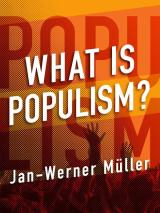
Abstract
Donald Trump, Silvio Berlusconi, Marine Le Pen, Hugo Chávez—populists are on the rise across the globe. But what exactly is populism? Should everyone who criticizes Wall Street or Washington be called a populist? What precisely is the difference between right-wing and left-wing populism? Does populism bring government closer to the people or is it a threat to democracy? Who are "the people" anyway and who can speak in their name? These questions have never been more pressing.
In this groundbreaking volume, Jan-Werner Müller argues that at populism's core is a rejection of pluralism. Populists will always claim that they and they alone represent the people and their true interests. Müller also shows that, contrary to conventional wisdom, populists can govern on the basis of their claim to exclusive moral representation of the people: if populists have enough power, they will end up creating an authoritarian state that excludes all those not considered part of the proper "people." The book proposes a number of concrete strategies for how liberal democrats should best deal with populists and, in particular, how to counter their claims to speak exclusively for "the silent majority" or "the real people."
Analytical, accessible, and provocative, What Is Populism? is grounded in history and draws on examples from Latin America, Europe, and the United States to define the characteristics of populism and the deeper causes of its electoral successes in our time.
T
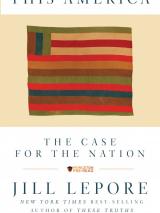
Abstract
From the acclaimed historian and New Yorker writer comes this urgent manifesto on the dilemma of nationalism and the erosion of liberalism in the twenty-first century.
At a time of much despair over the future of liberal democracy, Jill Lepore makes a stirring case for the nation in This America, a follow-up to her much-celebrated history of the United States, These Truths
With dangerous forms of nationalism on the rise, Lepore, a Harvard historian and New Yorker staff writer, repudiates nationalism here by explaining its long history–and the history of the idea of the nation itself–while calling for a “new Americanism”: a generous patriotism that requires an honest reckoning with America’s past.
Lepore begins her argument with a primer on the origins of nations, explaining how liberalism, the nation-state, and liberal nationalism, developed together. Illiberal nationalism, however, emerged in the United States after the Civil War–resulting in the failure of Reconstruction, the rise of Jim Crow, and the restriction of immigration. Much of American history, Lepore argues, has been a battle between these two forms of nationalism, liberal and illiberal, all the way down to the nation’s latest, bitter struggles over immigration.
Defending liberalism, as This America demonstrates, requires making the case for the nation. But American historians largely abandoned that defense in the 1960s when they stopped writing national history. By the 1980s they’d stopped studying the nation-state altogether and embraced globalism instead. “When serious historians abandon the study of the nation,” Lepore tellingly writes, “nationalism doesn’t die. Instead, it eats liberalism.” But liberalism is still in there, Lepore affirms, and This America is an attempt to pull it out. “In a world made up of nations, there is no more powerful way to fight the forces of prejudice, intolerance, and injustice than by a dedication to equality, citizenship, and equal rights, as guaranteed by a nation of laws.”
A manifesto for a better nation, and a call for a “new Americanism,” This America reclaims the nation’s future by reclaiming its past.
S
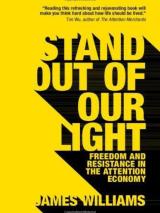
Abstract
Former Google advertising strategist, now Oxford-trained philosopher James Williams launches a plea to society and to the tech industry to help ensure that the technology we all carry with us every day does not distract us from pursuing our true goals in life. As information becomes ever more plentiful, the resource that is becoming more scarce is our attention. In this “attention economy,” we need to recognize the fundamental impacts of our new information environment on our lives in order to take back control. Drawing on insights ranging from Diogenes to contemporary tech leaders, Williams's thoughtful and impassioned analysis is sure to provoke discussion and debate. Williams is the inaugural winner of the Nine Dots Prize, a new Prize for creative thinking that tackles contemporary social issues. This title is also available as Open Access.
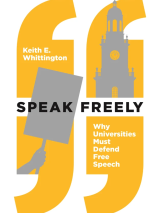
Abstract
Free speech is under attack at colleges and universities today, with critics on and off campus challenging the value of open inquiry and freewheeling intellectual debate. Too often speakers are shouted down, professors are threatened, and classes are disrupted. In Speak Freely, Keith Whittington argues that universities must protect and encourage free speech because vigorous free speech is the lifeblood of the university. Without free speech, a university cannot fulfill its most basic, fundamental, and essential purposes, including fostering freedom of thought, ideological diversity, and tolerance.
Examining such hot-button issues as trigger warnings, safe spaces, hate speech, disruptive protests, speaker disinvitations, the use of social media by faculty, and academic politics, Speak Freely describes the dangers of empowering campus censors to limit speech and enforce orthodoxy. It explains why free speech and civil discourse are at the heart of the university’s mission of creating and nurturing an open and diverse community dedicated to learning. It shows why universities must make space for voices from both the left and right. And it points out how better understanding why the university lives or dies by free speech can help guide everyone―including students, faculty, administrators, and alumni―when faced with difficult challenges such as unpopular, hateful, or dangerous speech.
Timely and vitally important, Speak Freely demonstrates why universities can succeed only by fostering more free speech, more free thought―and a greater tolerance for both.
O
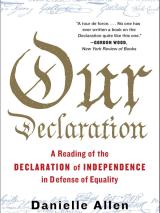
Abstract
In just 1,337 words, the Declaration of Independence altered the course of history. Written in 1776, it is the most profound document in the history of government since the Magna Carta, signed nearly 800 years ago in 1215. Yet despite its paramount importance, the Declaration, curiously, is rarely read from start to finish―much less understood.
Troubled by the fact that so few Americans actually know what it says, Danielle Allen, a political philosopher renowned for her work on justice and citizenship, set out to explore the arguments of the Declaration, reading it with both adult night students and University of Chicago undergraduates. Keenly aware that the Declaration is riddled with contradictions―liberating some while subjugating slaves and Native Americans―Allen and her students nonetheless came to see that the Declaration makes a coherent and riveting argument about equality. They found not a historical text that required memorization, but an animating force that could and did transform the course of their everyday lives.
In an "uncommonly elegant, incisive, and often poetic primer on America’s cardinal text," Our Declaration now brings these insights to the general reader, illuminating the "three great themes of the Declaration: equality, liberty, and the abiding power of language" (David M. Kennedy). Vividly evoking the colonial world between 1774 and 1777, Allen describes the challenges faced by John Adams, Thomas Jefferson, Benjamin Franklin, Roger Sherman, and Robert Livingston―the "Committee of Five" who had to write a document that reflected the aspirations of a restive population and forge an unprecedented social contract. Although the focus is usually on Jefferson, Allen restores credit not only to John Adams and Richard Henry Lee but also to clerk Timothy Matlack and printer Mary Katherine Goddard.
Allen also restores the astonishing text of the Declaration itself. Its list of self-evident truths does not end, as so many think, with our individual right to the "pursuit of happiness" but with the collective right of the people to reform government so that it will "effect their Safety and Happiness." The sentence laying out the self-evident truths leads us from the individual to the community―from our individual rights to what we can achieve only together, as a community constituted by bonds of equality. Challenging so much of our conventional political wisdom, Our Declaration boldly makes the case that we cannot have freedom as individuals without equality among us as a people.
With its cogent analysis and passionate advocacy, Our Declaration thrillingly affirms the continuing relevance of America’s founding text, ultimately revealing what democracy actually means and what it asks of us.
M
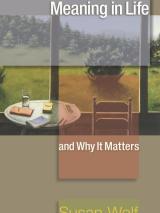
Abstract
Most people, including philosophers, tend to classify human motives as falling into one of two categories: the egoistic or the altruistic, the self-interested or the moral. According to Susan Wolf, however, much of what motivates us does not comfortably fit into this scheme. Often we act neither for our own sake nor out of duty or an impersonal concern for the world. Rather, we act out of love for objects that we rightly perceive as worthy of love―and it is these actions that give meaning to our lives. Wolf makes a compelling case that, along with happiness and morality, this kind of meaningfulness constitutes a distinctive dimension of a good life. Written in a lively and engaging style, and full of provocative examples, Meaning in Life and Why It Matters is a profound and original reflection on a subject of permanent human concern.
H
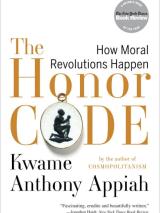
Abstract
In this groundbreaking work, Kwame Anthony Appiah, hailed as "one of the most relevant philosophers today" (New York Times Book Review), changes the way we understand human behavior and the way social reform is brought about. In brilliantly arguing that new democratic movements over the last century have not been driven by legislation from above, Appiah explores the end of the duel in aristocratic England, the tumultuous struggles over footbinding in nineteenth-century China, the uprising of ordinary people against Atlantic slavery, and the horrors of "honor killing" in contemporary Pakistan. Intertwining philosophy and historical narrative, he has created "a fascinating study of moral evolution" (Philadelphia Inquirer) that demonstrates the critical role honor plays in the struggle against man's inhumanity to man.
E
Abstract
Fusce a quam. Donec posuere vulputate arcu. Vivamus elementum semper nisi. Proin sapien ipsum, porta a, auctor quis, euismod ut, mi.
Publications List - Few options enabled
This Publications List displays citations without any exposed filters, exposed sorting, or grouping. Thumbnail images and abstracts are not displayed.
